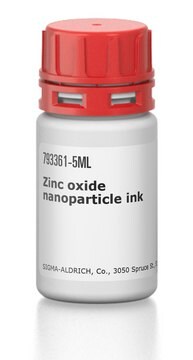633844
Zinc iron oxide
nanopowder, <100 nm particle size (BET), >99% trace metals basis
Synonym(s):
Diiron zinc tetraoxide
About This Item
Recommended Products
Quality Level
Assay
>99% trace metals basis
form
nanopowder
particle size
<100 nm (BET)
SMILES string
O=[Fe]O[Zn]O[Fe]=O
InChI
1S/2Fe.4O.Zn
InChI key
WGEATSXPYVGFCC-UHFFFAOYSA-N
General description
Application
Legal Information
Storage Class Code
11 - Combustible Solids
WGK
WGK 3
Flash Point(F)
Not applicable
Flash Point(C)
Not applicable
Personal Protective Equipment
Choose from one of the most recent versions:
Already Own This Product?
Find documentation for the products that you have recently purchased in the Document Library.
Customers Also Viewed
Articles
Magnetic nanoparticles have attracted tremendous attention due to their novel properties and their potential applications in magnetic recording, magnetic energy storage and biomedicine.
Organic photovoltaics (OPVs) represent a low-cost, lightweight, and scalable alternative to conventional solar cells. While significant progress has been made in the development of conventional bulk heterojunction cells, new approaches are required to achieve the performance and stability necessary to enable commercially successful OPVs.
TiO2 exhibits wide band gap semiconductor and memristor properties electronically, with high opacity and UV absorbance optically.
Catalytic water splitting produces hydrogen crucial for renewable energy, petroleum refining, and chemical industry applications like methanol production.
Our team of scientists has experience in all areas of research including Life Science, Material Science, Chemical Synthesis, Chromatography, Analytical and many others.
Contact Technical Service









